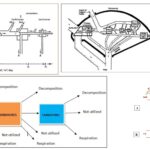Describe excretion as the removal of toxic materials and the waste products of metabolism from organisms
Describe excretion as the removal of toxic materials and the waste products of metabolism from organisms
Please login to submit an answer.
Excretion is a crucial biological process that involves the removal of toxic materials and waste products generated from metabolism in living organisms. This process is vital for maintaining homeostasis, ensuring that harmful substances do not accumulate in the body, which could lead to detrimental health effects.
Definition and Importance of Excretion
Excretion refers to the physiological elimination of waste products from an organism’s body. These wastes include both toxic materials produced during metabolic activities and excess substances that are no longer needed by the organism. The primary goal of excretion is to prevent the accumulation of these potentially harmful compounds, thereby safeguarding the organism’s internal environment and overall health.
Types of Waste Products
The waste products excreted by organisms can be broadly categorized into two types:
- Metabolic Wastes: These are by-products of cellular metabolism, including:
- Nitrogenous wastes: Such as ammonia, urea, and uric acid, which are produced from the breakdown of proteins. Ammonia is highly toxic and is primarily excreted by aquatic animals, while mammals convert it into urea for safer excretion.
- Carbon dioxide: A gaseous waste produced during cellular respiration, eliminated primarily through the lungs.
- Other substances: Including salts and excess water, which are also excreted to maintain fluid balance.
- Non-Metabolic Wastes: These include undigested food residues and other materials that are not utilized by the organism.
Mechanisms of Excretion
Different organisms have evolved various mechanisms for excretion, depending on their complexity and habitat:
- Aquatic Animals: Many excrete ammonia directly into the water due to its high solubility and dilution potential.
- Mammals: Utilize kidneys to filter blood, reabsorb necessary substances, and excrete urea along with excess salts and water through urine.
- Birds and Reptiles: Excrete uric acid, which is less toxic and conserves water, making it suitable for terrestrial life.
- Plants: Excrete waste products through transpiration (loss of water vapor) and other mechanisms like shedding leaves or releasing volatile compounds.
Excretory Organs
In humans and many animals, specific organs are dedicated to the excretion process:
- Kidneys: The primary organs responsible for filtering blood and producing urine.
- Lungs: Facilitate the removal of carbon dioxide and water vapor.
- Skin: Eliminates excess salts and water through sweat.
- Liver: Processes toxins and metabolic wastes before they are sent to be excreted
- Share on Facebook
- Share on Twitter
- Share on LinkedIn
Helpful: 0%




